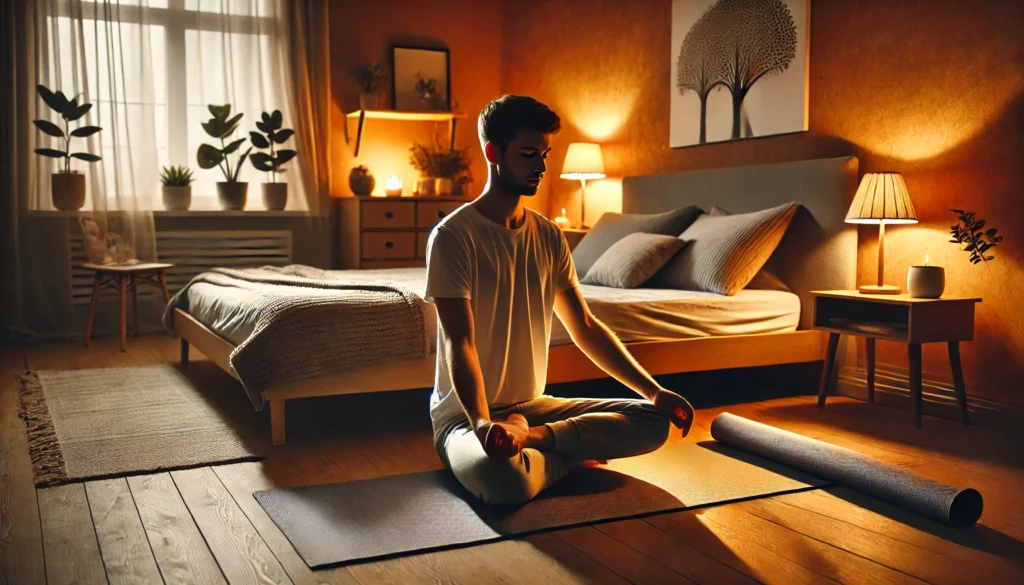Sleep is a vital part of our lives. It’s a time when our bodies rest, rejuvenate, and prepare for the next day.
But how much sleep do we really need?
This question is especially pertinent for young adults. At 18 years old, they’re at a critical stage of development.
The National Sleep Foundation recommends 7-9 hours of sleep for this age group. But is seven hours enough?
This article delves into the science of sleep. It explores the impact of getting seven hours of sleep on the health and well-being of 18-year-olds.
We’ll look at the importance of REM and deep sleep cycles. We’ll discuss the effects of sleep deprivation on mood, learning, memory, and overall health.
We’ll also provide practical advice for optimizing sleep. This is based on the latest research and trends.
Whether you’re a young adult, a health and wellness coach, a science journalist, or a biohacker, this article is for you. It’s time to understand the power of sleep and how to harness it for better health and performance.
You May Also Like: Sleep Hygiene: Key Practices for Health
Understanding Sleep Needs for Young Adults
Young adults are in a transitional phase. Their bodies are still maturing, leading to unique sleep needs.
Sleep is crucial for maintaining cognitive function, mood, and physical health. At age 18, the demands of life intensify.
Educational pressures and social activities can disrupt sleep patterns. It’s common for young adults to feel sleep-deprived.
In reality, sleep affects every aspect of a young adult’s life. The impact includes learning, memory, and emotional stability.
The National Sleep Foundation suggests 7-9 hours for 18 to 25-year-olds. These hours support optimal health and performance.
Key elements to consider for sleep quality include:
- Consistency in sleep schedule to maintain circadian rhythm.
- Creating a sleep-conducive environment with minimal light and sound.
- Limiting caffeine intake, especially in the afternoon.
Understanding these needs can help young adults prioritize their sleep. Small adjustments can lead to significant improvements in well-being.
The Science of Sleep Cycles
Sleep is more complex than just closing your eyes. It’s structured into cycles, each with distinct purposes.
A typical sleep cycle lasts about 90 minutes. It includes various stages of light, deep, and REM (Rapid Eye Movement) sleep.
Light sleep serves as a transition between waking and rest. Deep sleep is vital for muscle recovery and growth.
REM sleep is when dreaming occurs. This stage supports brain functions like memory and learning.
During REM, the brain processes emotions and experiences from the day. This cycle repeats several times each night.
Quality sleep involves cycling through these stages seamlessly. Disruptions can hinder both cognitive and physical restoration.
Understanding these cycles highlights the importance of uninterrupted sleep. This is key for young adults seeking peak performance.
Is 7 Hours of Sleep Sufficient for an 18-Year-Old?
The big question remains: is seven hours enough? The answer varies depending on individual needs and lifestyle.
Seven hours might be adequate for some, but others might require more. It depends on how one’s body responds to sleep.
Sleep needs differ due to genetics, stress levels, and daily demands. A sleep calculator can be useful to gauge specific needs.
You can assess:
- How refreshed you feel upon waking.
- Your ability to remain alert throughout the day.
- The impact of physical and mental activities on your energy.
Young adults often juggle responsibilities and need quality sleep for balance.
Tools like sleep calculators help estimate required rest based on personal data. They consider factors like age, activity, and bedtime routines.
Ultimately, prioritizing sleep is vital. Sleep directly impacts health, mood, and overall quality of life. Balancing priorities with rest can lead to better outcomes in daily life.

The Consequences of Sleep Deprivation
Sleep deprivation is a pressing issue for young adults. It often stems from academic pressures, social activities, or technology use. Lack of sleep can lead to a host of problems, impacting various facets of health.
Sleep deprivation affects the body’s ability to function properly. Cognitive tasks become harder, memory declines, and decision-making skills suffer. Long-term sleep loss can lead to more severe health issues, including chronic diseases.
Over time, poor sleep can take a toll on one’s emotional state. It may result in increased irritability, stress, and even depression. These emotional shifts can further exacerbate sleep problems, creating a vicious cycle.
Physical health isn’t immune to sleep loss either. Weight gain, a weakened immune system, and hormonal imbalances are common consequences. These effects can be especially concerning for young adults in their developmental years.
To break this cycle, it’s important to establish a healthy sleep routine. Identifying stressors and limiting nighttime distractions can promote better sleep. Sustainable sleep habits enhance overall well-being, supporting long-term health.
Impact on Mental Health and Cognitive Function
Mental health is deeply intertwined with sleep quality. Sleep deprivation can lead to increased anxiety and depressive symptoms. For an 18-year-old, these shifts in mood can be particularly destabilizing.
Cognitive functions like attention, focus, and problem-solving are also affected. An insufficient amount of sleep can impair learning and academic performance. Students may struggle to retain information or concentrate during lectures.
Sleep plays a crucial role in consolidating memories. Without adequate rest, recalling information becomes challenging. This can hinder academic and everyday tasks, leading to frustration and stress.
Addressing sleep issues is vital for mental health and cognitive vitality. Simple practices like relaxation techniques or mindfulness can enhance sleep quality. Improved sleep encourages better mental health and cognitive resilience.
Physical Health and Sleep: The Hormonal and Immune Response
Physical health relies significantly on restful sleep. During sleep, the body undergoes vital repairs and regulatory processes. Hormonal balance, including growth hormone and cortisol regulation, is maintained through proper sleep.
Growth hormone secretion peaks during deep sleep. This hormone is essential for tissue repair and muscle growth. An imbalance caused by sleep deprivation can impair physical development and recovery.
The immune system also depends on sleep to function efficiently. A lack of sleep weakens immune response, making the body more susceptible to illnesses. This can result in frequent colds or extended recovery times after illness.
Hormones such as leptin and ghrelin, which regulate appetite, are influenced by sleep. Poor sleep can lead to increased hunger and potential weight gain. Stabilizing sleep patterns helps regulate these hormones, supporting healthy weight management.
Consistently prioritizing sleep aids in maintaining physical health. For young adults, developing these habits can foster long-term wellness. Balanced sleep promotes both immediate and future health advantages.
Optimizing Sleep for Better Health
Optimizing sleep is crucial for enhancing overall health. Implementing effective sleep strategies can lead to significant improvements. These adjustments can yield both immediate benefits and long-term health gains.
A consistent sleep schedule is essential for regulating the body’s circadian rhythms. Setting a regular bedtime and wake-up time, even on weekends, helps stabilize these rhythms. This consistency enhances sleep quality and promotes restorative rest.
Creating a sleep-friendly environment is another key factor. A dark, quiet, and cool room can improve sleep quality significantly. Investing in comfortable bedding and eliminating disruptions fosters better sleep habits.
Mindfulness and relaxation techniques, such as meditation or deep breathing, are highly effective. Practicing these techniques before bed can help calm the mind and prepare the body for rest. They are invaluable tools for those struggling with sleep disturbances.
Sleep Hygiene: Best Practices for Quality Sleep
Sleep hygiene involves practices that support restful sleep. Establishing these habits can profoundly impact sleep quality. They form the foundation of a good night’s rest.
Some best practices for sleep hygiene include:
- Setting a consistent sleep schedule: Go to bed and wake up at the same time daily.
- Creating a restful environment: Ensure your bedroom is quiet, dark, and at a comfortable temperature.
- Limiting screen time before bed: Avoid devices at least 30 minutes before sleep.
- Avoiding caffeine and heavy meals late in the day: These can disrupt sleep, so consume them earlier.
- Incorporating relaxation techniques: Practices like meditation or gentle yoga can ease the transition to sleep.
Adopting a regular bedtime routine can further enhance sleep hygiene. Activities like reading or taking a warm bath signal the body to wind down. These calming rituals can improve the ability to fall and stay asleep.
Additionally, managing stress effectively can enhance sleep hygiene. Techniques such as deep breathing or journaling help reduce anxiety before bed. A peaceful mind is more conducive to sleep, facilitating deeper rest.
The Role of Diet, Exercise, and Technology in Sleep
Diet plays a critical role in sleep quality. Foods rich in tryptophan, like turkey and nuts, promote serotonin production. This chemical precursor supports melatonin synthesis, helping regulate sleep cycles.
Exercise is another crucial component of healthy sleep. Regular physical activity, particularly in the morning or afternoon, promotes deeper sleep. Exercise can help to alleviate stress, further enhancing sleep quality.
Technology, when used wisely, can aid sleep. Sleep apps and trackers offer personalized insights into sleep patterns. These tools can help identify areas needing improvement for better rest.
However, excessive screen time disrupts sleep due to blue light exposure. Limiting device use before bed is essential to maintain the body’s natural sleep-wake cycle. Such practices encourage better sleep and overall health.

Tools and Calculators for Personalized Sleep Analysis
Personalized sleep analysis can empower individuals to understand their unique sleep needs. Various tools and calculators simplify this process. They offer insights into sleep patterns and potential areas for improvement.
Sleep calculators help determine optimal bedtimes and wake-up times. By inputting desired hours of sleep, users can plan schedules that enhance sleep quality. These tools take into account personal sleep preferences and lifestyle factors.
Tracking technology offers even deeper insights. Wearable devices and smartphone apps monitor sleep cycles and patterns. They provide data on REM, deep sleep, and interruptions, allowing for targeted sleep interventions.
Some popular sleep tools include:
- Hours of sleep calculators to estimate optimal sleep duration.
- Sleep tracking apps that monitor cycles and disruptions.
- REM cycle estimators to optimize timings for refreshing sleep.
- Data-driven reports from smart devices for in-depth analysis.
These resources facilitate informed decisions about sleep habits, catering to individual needs. Armed with personalized data, users can make adjustments for better sleep and improved health outcomes.
How to Use Sleep Calculators and Trackers
Sleep calculators offer a straightforward way to assess sleep needs. By inputting basic information, they estimate ideal sleep times. This helps individuals align their schedules with natural circadian rhythms.
Using a sleep calculator involves entering your age and desired wake-up time. The tool then suggests the best sleep window to achieve optimal rest. This informed guidance fosters consistency in sleep schedules, enhancing overall quality.
Sleep trackers delve deeper into nightly rest. Devices like smartwatches or phone apps record various sleep stages. They provide data on how long you spend in each cycle, identifying patterns or issues that may need addressing.
These trackers can highlight trends in your sleep hygiene. Over time, this information helps you refine sleeping habits. As you adjust routines, improvements in sleep quality and health are likely to follow.
By leveraging these technologies, individuals gain a better understanding of their unique sleep patterns. This knowledge empowers them to make positive changes for restful and rejuvenating sleep.
The Future of Sleep: Trends and Innovations
The future of sleep holds exciting potential through science and technology. Innovations aim to uncover new ways to enhance sleep quality and effectiveness. These breakthroughs promise a deeper understanding of individual sleep needs and solutions.
Emerging sleep technologies focus on personalized approaches. Smart mattresses with integrated sensors track your sleep patterns in detail. These devices offer real-time adjustments to optimize sleep environments and ensure comfort.
Researchers are exploring the role of AI in sleep health. Algorithms analyze vast amounts of sleep data, providing tailored advice and interventions. This personalized approach ensures that sleep recommendations are more precise and effective.
Continued advancements in sleep science are expected. These breakthroughs will influence both our understanding and management of sleep. Such progress could transform our approach to sleep health and overall well-being.
Biohacking Sleep: Techniques for Enhanced Performance
Biohacking aims to optimize sleep by leveraging science and technology. It combines data-driven insights with experimental techniques to improve sleep quality. This approach tailors sleep strategies to individual needs for maximum benefit.
Light exposure is a popular biohacking tool. Regulating natural and artificial light helps align circadian rhythms. This practice encourages better sleep patterns and wakefulness during the day.
Nutritional interventions are also common in biohacking. Certain supplements and dietary changes can support hormonal balance. This impacts sleep cycles and enhances overall restfulness.
Individuals can experiment with various biohacking techniques. By systematically adjusting factors, they discover what works best for their sleep. This personalized approach aims to ensure restorative sleep and enhance daily performance.
Biohacking can be a powerful tool for anyone seeking optimal sleep. Engaging with these techniques may yield significant improvements in health and energy levels.

Conclusion: Embracing the Importance of Sleep
Sleep is an indispensable pillar of health and wellness. Recognizing its profound impact empowers us to prioritize rest. Whether young adults or seasoned biohackers, understanding sleep’s role is crucial.
In our fast-paced world, integrating healthy sleep habits can transform lives. By investing time and effort into optimizing our sleep, we enhance our mental and physical well-being. Let us celebrate the power of sleep as a foundation for a healthier future.
Further Reading:
Sleep Health Foundation: How much sleep do you really need?
Cleveland Clinic: How Much Sleep Kids Need: Recommended Hours by Age
Important Note: The information contained in this article is for general informational purposes only, and should not be construed as health or medical advice, nor is it intended to diagnose, prevent, treat, or cure any disease or health condition. Before embarking on any diet, fitness regimen, or program of nutritional supplementation, it is advisable to consult your healthcare professional in order to determine its safety and probable efficacy in terms of your individual state of health.
Regarding Nutritional Supplements Or Other Non-Prescription Health Products: If any nutritional supplements or other non-prescription health products are mentioned in the foregoing article, any claims or statements made about them have not been evaluated by the U.S. Food and Drug Administration, and such nutritional supplements or other health products are not intended to diagnose, treat, cure, or prevent any disease.


